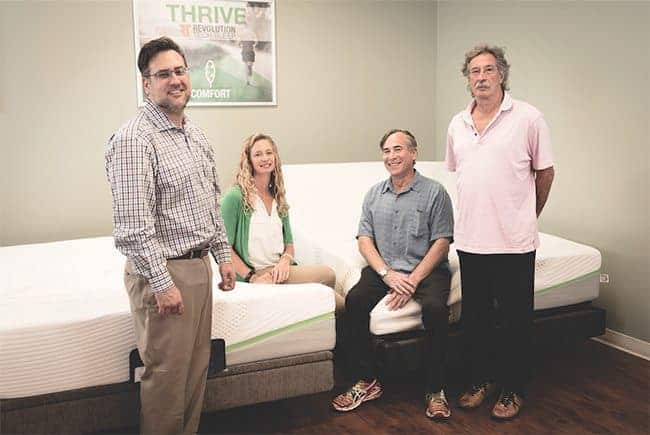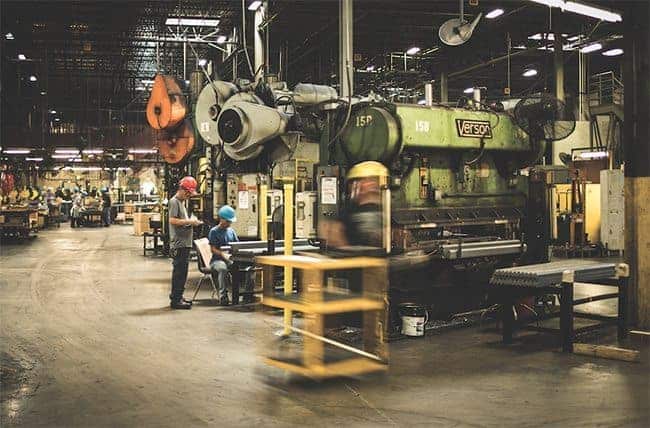BY DOROTHY WHITCOMB
Family-owned company opening new markets, adding bedding veterans
From the start, innovation and reinvention have driven growth at Glideaway, a St. Louis-based manufacturer and distributor of mattresses, bed frames and other sleep products.
Three generations of the Fredman family have kept a careful eye on shifts in the bedding market, company executives say, with one goal in mind—to bring high-quality, value-based products to retailers.
Today, the company is streamlining and refining its internal business practices, hiring industry veterans for sales and middle-management positions, and broadening the channels into which it sells.

St. Louis-based Glideaway is run by many members of the founding Fredman family but also has been making a concerted effort to add bedding industry veterans to its staff. The mix is shown here: Dan Baker (left), executive vice president of North American sales; Angie Tinsley, marketing director; Ron Fredman, chief operating officer; and Carmi Fredman, president.
Glideaway is a division of Fredman Bros. Furniture Co., which was founded in 1912 when four brothers, David, Harry, Neil and Manuel Fredman, emigrated from Ukraine to the United States. Initially, they sold groceries door to door, but by 1920, their business had expanded to include furniture. By 1940, they had a chain of 28 furniture stores spread throughout Illinois and Missouri.
The stage was set for Glideaway when Harry Fredman developed a slatless steel bed rail system in 1960. “The history of evolving from groceries to furniture to metal bed rails set the framework for the constant innovation that is at the core of Glideaway today,” Ron Fredman, chief operating officer, says.
Glideaway is family owned and operated with 10 family members ranging in age from 33 to 63 actively involved in the business. That, President Carmi Fredman says, has a big impact on the culture of the company and the way the business is run. “A lot of decisions are made by consensus and because we argue things out, it might seem a little dysfunctional,” he says. “We are family and we value the families that work for us, some of whom have been with us for 30 years.”
Certainly, family—everyone’s family—matters, Ron Fredman reiterates. “When St. Louis became a major refugee center for the Vietnamese in the ’70s and ’80s, we began hiring them through Catholic Charities and the International Institute of St. Louis. Now we employ Somalis, Sudanese and Russians, as well. As time passed, their families came to work here, too. They are loyal and hardworking and some have moved into management positions.”
Adding experienced outsiders
Dan Baker, executive vice president of North American sales, joined Glideaway four years ago as the company began looking for ways to open new sales channels and make internal business practices more efficient and cost effective. His specific mandate was to increase the company’s brick-and-mortar retailer base, develop a contract and hospitality market, create an e-commerce strategy and establish Glideaway as an original equipment manufacturer. He has a team of 25 sales representatives and three vice presidents working with him.
Hiring Baker was a watershed moment for the company. “We made a decision to up our talent pool in sales and for the past five years, we’ve hired people with 10 to 15 years of experience in the mattress industry,” Carmi Fredman says.
Baker has 20 years of marketing and sales experience at mattress manufacturers including Southerland, NexGel and Spring Air. About a year ago, Glideaway also added industry veterans Scott Miller and Ben Crowder to its sales team. Miller, who is vice president of sales for OEM and contract, has more than 30 years of bedding industry experience, including sales and marketing posts at International Bedding Corp., Simmons and Southerland. Crowder is director of contract sales, a new position for Glideaway. He held a similar position at Simmons for 12 years.
The team is focusing on building Glideaway’s sales in nonretail sectors, such as hospitality, military exchange and housing, health care, rental and corporate housing, and OEM. The year-old focus on OEM, in particular, is bearing fruit, Carmi Fredman says. “We’re going after top 10 bedding manufacturers and big-box stores. We have a couple of second-tier players and, if we land a couple more, we could easily double our overall units for adjustable beds,” he says.
He is even more optimistic about the impact that nonretail sales could have on Glideaway’s overall annual sales. “Over the next three to five years, they could grow to be 25% of our total annual sales,” he says.
Like many companies, Glideaway’s annual sales took a hit during the Great Recession. “Until 2008, our growth rate was in the double digits or high single digits,” Carmi Fredman says. “During the recession, bed frames collapsed and units dropped by 30%. In the last couple of years, annual sales growth has turned around to high single or low double digits again, and I’m optimistic that we’re going to be able to keep that up.”
Helping retailers succeed
Still, brick-and-mortar retailers remain the core of Glideaway’s business. The company, Baker says, has about 4,500 accounts on its books and the majority fall into that category.
“Sometimes retailers are looking for a house brand that they can mold their presentation around,” says Angie Tinsley, marketing director. “Many retailers use Glideaway as that brand, and we work hard to keep them competitive in a world increasingly dominated by mega retailers.”
Glideaway launched its Signature program a few years ago to help smaller retailers increase their competitiveness. “The program has three levels of discounts based on the retailer’s commitment to Glideaway,” Baker says. “Because larger retailers get such a sharp price from the get-go, it’s really designed for B- and C-level retailers.”
In addition to product training, retailers can count on Glideaway’s sales representatives to “consult on ways to grow their business,” Baker says. “Our reps know what the competition is doing and where product gaps are so they can help the retailer have everything the end consumer needs or wants when she comes in.”
The company’s “one order, one delivery, one invoice” philosophy also helps retailers reduce “soft costs,” Baker says. Every time a retailer processes an invoice, he notes, “it costs $2 to $35.” One-truck delivery also makes inventory control easier.
With the appointment of Ron Fredman as COO about a year ago, Glideaway began an assault on its own soft costs. In the new role, Fredman has launched a series of initiatives designed to increase efficiencies in production, shipping and receiving.
“We introduced data gathering, reduced our SKUs, and reorganized our warehouse and shipping procedures,” he says. “As a result, we reduced shipping errors by 80%. Going to third-party shipping gave us almost real-time measuring of freight costs and accurate shipping times to customers.”
Ron Freedman notes that Glideaway also plans to invest in a new software management system for its customer relations department, as well as “new machinery to help us process tests of domestically produced and imported products.”
Business built on ‘Lifestyle’ and ‘Steel’
Glideaway divides its product offerings into two categories, Lifestyle and Steel. Lifestyle includes mattresses, pillows, protectors and adjustable beds. The Steel category includes bed frames and accessories, bases, foundations and center supports. Last year, company executives say, annual sales were split roughly between the two categories—Lifestyle 52%; Steel 48%.
Adjustable bases are a strong contributor to growth of the Lifestyle segment. The company introduced its own Comfort Base brand in 2015, allowing it to double adjustable sales over 2014, Tinsley says. “From 2011, when we began distributing adjustable bases, to 2015, our base sales increased almost 700%,” she says. “We believe the dramatic increase came from both overall demand in the marketplace and the introduction of our own brand, with options that better meet the needs of retailers and consumers.”

Products in Glideaway’s Steel segment are manufactured in its 185,000-square-foot production, distribution and showroom facility in St. Louis. (Items in its Lifestyle segment are made in China.)
Glideaway offers seven Comfort Base models, which range in retail price from $799 to $1,999 for queen size. Two more bases were introduced in July at the Las Vegas Market to offer more choice at a variety of price points. The new Freestyle base has a single, split-deck design that sits directly atop an existing foundation or platform. Its low profile and light weight make it a good e-commerce option, the company says. It retails between $799 and $999 in queen. The Ascend model adds a programmable remote and includes Glideaway’s patented Elevate Lift feature, which allows the entire base to rise to a 12-degree incline. It retails between $1,599 and $1,699.
Glideaway has three collections of Sleepharmony-branded mattresses. The three-model Revolution Tech Sleep memory foam collection is the company’s latest introduction. The models range from 8 inches to 12 inches high and feature Air+ mesh panels for breathability and Feran Ice gel for cooling. They range in price from $699 to $1,299 in queen size.
The Sleepharmony CG Series features one memory foam mattress and two hybrids, each with a solid panel of gel in the top layer. Queen sizes retail from $599 to $999. The Intuitions collection includes one memory foam model with a range of comfort choices and two hybrid models. Called Intuition Visions, the hybrids include a layer of memory foam atop an individually wrapped coil unit. (The company prefers to call it an individually encased steel coil unit.) Retail prices in the Intuitions collection range from $799 to $1,299 for queen sizes.
Glideaway also offers Revolution Tech pillows at $49 to $99 and four grades of mattress protectors.
The company began producing its Lifestyle products in China nine years ago. “It was a steep learning curve, but now we have a long-term relationship with many factories, several of which are family-owned,” Carmi Fredman says. “We have several employees in China at our main office in Beijing who are in charge of project management, quality control and communication.”
Products in Glideaway’s Steel segment are manufactured in St. Louis at its 185,000-square-foot manufacturing, distribution and showroom facility. The company also operates a warehouse and distribution center in Portland, Oregon.
‘It’s about product and people’
Although Glideaway executives say they are pleased with the company’s current trajectory, they are acutely aware of the challenges they face. “One of our biggest challenges is the downward price pressure on product,” Carmi Fredman says. “Our model is a combination of manufacturing in St. Louis and importing. The more we grow, the more inventory we have to carry. As our product becomes more innovative, we need to continue to build our quality control department so that everything is trouble-free here and in China.”
Although Baker acknowledges the challenges, he hopes to see the company double its annual sales in five years. “At the end of the day, it’s about product and people,” Baker says. “Glideaway has brought more talent to all areas of the company—talent that can handle where we want to be.”




